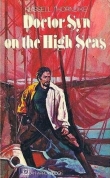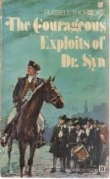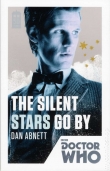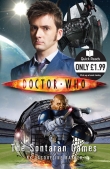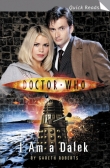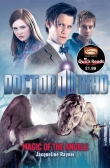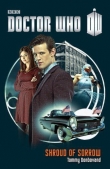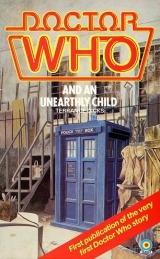
Текст книги "Doctor Who and an Unearthly Child"
Автор книги: Terrance Dicks
Жанры:
Классическое фэнтези
,сообщить о нарушении
Текущая страница: 2 (всего у книги 6 страниц)
The TARDIS
Barbara Wright and Ian Chesterton stood gazing around them in disbelief, their brains refusing to take in the evidence of their eyes and ears.
They should have been inside an enclosed cupboard-sized space – but they were not. Instead, they stood inside a large, brightly lit control room. It was dominated by a many-sided central structure which seemed to consist of a number of instrument banks arranged round a transparent central column packed with complex machinery.
Strangest of all were the incongruous objects dotted about here and there. They included a number of old-fashioned chairs and the statue of some kind of bird on top of a tall column. Beside it stood Susan, looking at them in utter amazement.
Ian blinked incredulously, his mind filled with a wrenching sense of unreality. He heard the old man say calmly, 'Close the door, Susan.'
Susan touched a control on the central console, and the door closed with an eerie electronic hum.
The old man took off his cloak and hat, and tossed them onto a chair. The clothes beneath were even more eccentric (check trousers with old-fashioned boots, and a kind of frock-coat worn with a cravat and a high-wing collar). The general effect was that of a family solicitor from some nineteenth-century novel. Like the statue and the padded chairs, the old man looked strangely out of place in this ultra-technological setting.
But he was obviously quite at home here. Rubbing his bony hands together, he looked disapprovingly at the two intruders. 'I believe these people are known to you, Susan?'
'They're two of my school teachers.' Susan seemed almost as astonished as Barbara and Ian. 'What are you doing here?'
'Presumably they followed you,' said the Doctor acidly. 'That ridiculous school! I knew something like this would happen if we stayed in one place too long.'
'But why should they follow me?'
'Ask them,' said the old man. He turned away to study a row of instruments on the central console.
Barbara looked around the astounding room, and then back at Susan. 'Is this place really your home, Susan?'
'Yes... well, at least, it's the only home I have now.'
The old man looked up. 'And what's wrong with it?'
Ian rubbed his eyes and blinked – but nothing changed. 'But it was just a police box.'
The old man smiled. 'To you, perhaps,' he said condescendingly.
Barbara said, 'And this is your grandfather?'
'Yes.'
Barbara turned to the old man. 'So you must be Doctor Foreman?'
The old man smiled. 'Not really. The name was on the notice-board, and I borrowed it. It might be best if you were to address me simply as Doctor.'
'Very well, then – Doctor. Why didn't you tell us who you were?'
'I don't discuss my private life with strangers,' said the Doctor haughtily.
Ian was still struggling to understand the central mystery. 'But it was just a police box! I walked all round it. Barbara, you saw me.
How come it's bigger on the inside than on the outside?'
'You don't deserve any explanations,' said the Doctor pettishly.
'You pushed your way in here, uninvited and unwelcome...'
'Now, just a minute,' said Ian doggedly. 'I know this is absurd.
It was just a police box, I walked all round it. I just don't understand...'
The Doctor was fiddling with one of the controls. 'Look at this, Susan,' he said querulously. 'It's stopped again. I've tried to repair it, but...' He broke off, shooting a malicious glance at Ian. 'No, of course, you don't understand. How could you?'
'But I want to understand,' shouted Ian.
The Doctor waved him away. 'Yes, yes... By the way, Susan, I managed to find a replacement for that portofilio. It was quite a job, but I think it'll serve...'
Ian pounded his fists against the walls of the room. 'It's an illusion, it must be.'
The Doctor sighed. 'What is he talking about now?'
'Ian, what are you doing?' whispered Barbara.
'I don't know,' said Ian helplessly.
The Doctor smiled maliciously at Ian's confusion. 'You don't understand, so you find excuses for yourself. Illusion, indeed! See here, young man. You say you can't fit a large space inside a small one? So you couldn't fit an enormous building into a little room?'
'No,' said Ian. 'No, you couldn't.'
'But you've invented television by now, haven't you?' said the Doctor.
'Yes.'
'So – by showing an enormous building on your television screen, you can do something you said was humanly impossible, can't you?'
'Well, yes, in a sense,' said Ian doubtfully. 'But all the same...'
The old man cackled triumphantly. 'Not quite clear, is it? I can see by your face that you're not certain, you don't understand. I knew you wouldn't. Never mind!' The Doctor seemed positively delighted by Ian's lack of comprehension. He fiddled with the control console, muttering to himself. 'Now, which switch was it? This one – no, this one.' He looked up at Ian and Barbara. 'The point is not so much whether you understand what has already happened to you, it's what's going to happen to you. You could tell everyone about the ship – and we can't have that.
'Ship?' asked Ian, more confused than ever.
'Yes, ship,' said the Doctor sharply. 'This thing doesn't roll along on wheels, you know.'
'You mean it moves?' asked Barbara.
Susan nodded proudly. 'The TARDIS can go anywhere in Time and Space.'
'TARDIS? I don't understand you, Susan.'
'Well, I made the name up, actually. TARDIS, from the initials. Time and Relative Dimension in Space. Don't you understand? The dimensions inside are different from those outside.'
Ian drew a deep breath. 'Just let me get this straight. A thing that looks like a police box standing in a junk yard... and it can travel in Time and Space?'
'Yes,' said Susan.
'Quite so,' confirmed the Doctor briskly.
'But that's ridiculous!'
Susan looked in anguish at the old man. 'Why won't they believe us?'
'Well, how can we?' said Barbara patiently. 'It's so obviously impossible.'
Susan stamped her foot in frustration, and the Doctor chuckled.
'Now, don't get exasperated, Susan. Remember the Red Indian when he saw his first steam train – his savage mind probably thought it was an illusion too!'
'You're treating us like savages,' said Ian bitterly. 'Savages or children!'
The Doctor gave his infuriatingly superior smile. 'Am I? The children of my civilisation would be insulted!'
' Your civilisation?'
'Yes, my civilisation. I tolerate this century, but I don't enjoy it.
Have you ever thought what it's like to be wanderers in the fourth dimension, young man? Have you? To be exiles! Susan and I are cut off from our own civilisation, without friends or protection, but one day we shall go back.' He stared into the distance. 'Yes, one day...
one day...'
Perhaps the human mind can only take in so many surprises at a time. At this new revelation, Barbara and Ian exchanged looks of sheer disbelief.
'It's true,' cried Susan desperately. 'It's all true! You don't know what you've done, coming here.' She turned to the Doctor.
'Grandfather, let them go now, please, they can't harm us. I know these people, their minds reject things they don't understand. They won't tell anyone and even if they did, they wouldn't be believed.'
The Doctor's face was suddenly cold and hard. 'No.'
'You can't keep us here!' said Ian defiantly.
'Can't I?' said the Doctor. Something about his confident smile made Ian feel very uneasy.
Barbara went over to Susan and put an arm around her shoulders. 'Susan, listen to me. Can't you see that all this is an illusion, a fantasy? If you like, it's a game that you and your grandfather are playing. You can't expect us to believe it as well.'
'But it's not a game,' said Susan desperately. 'It's not! I love England in the twentieth century. I love your school. The last five months have been the happiest of my life.'
'You talk as if you weren't one of us,' said Barbara. 'But you are! You look like us, you sound like us...'
Susan's face was solemn. 'I was born in another time, another world.'
'Now look here, Susan,' began Ian. He gave up in despair.
'Come on, Barbara, let's get out of here.'
'You can't get out,' cried Susan. 'He won't let you go!'
Ian pushed past her and strode up to the Doctor, who was still standing at the control panel. He gazed down at the maze of switches and dials.
'Susan closed the door from here, I saw her. Now, which is it, Doctor? Which control operates the door?'
'Still think it's all an illusion?' asked the Doctor mockingly.
Ian glared at him. 'I know that free movement in Time and Space is a scientific dream that isn't going to be solved in a junk yard!'
'Your arrogance is nearly as great as your ignorance, young man!'
'Will you open the door?'
The Doctor gave another of his mocking chuckles.
'Open that door!'
The Doctor didn't move.
Ian looked appealingly at Susan. 'Won't you help us, Susan?'
She hesitated, then shook her head. 'I'm sorry, I mustn't.'
Ian reached out towards the console. 'Very well, then I'll have to risk it myself.'
The Doctor shrugged. 'I can hardly stop you.'
(Only Susan saw the Doctor's hand reach out to the console and flick the immobiliser switch.)
Ian reached out to the controls and hovered for a moment.
As his hand came down, Susan screamed, 'Not that one, it's live!'
It was too late. Ian touched the faulty switch, there was a crackle of power, and he was hurled clean across the control room.
He slumped dazed against the wall, and slid to the floor.
Barbara ran to kneel beside him. She looked angrily up at the Doctor.
'What on earth do you think you're doing? Ian, are you all right?'
'I think so. Just a bit shaken.'
Barbara helped him to his feet.
Susan was talking to the Doctor in a low urgent voice.
'Grandfather, let them go now, please.'
The old man shook his head in childish obstinacy. 'By tomorrow we should be a public spectacle, a subject for news and gossip!'
'They won't say anything.'
'My dear child, of course they will! Put yourself in their place.
They're bound to make some sort of complaint to the authorities or, at the very least, talk to their friends.' He paused impressively. 'If I do let them go, Susan, we shall have to go as well.'
'No, grandfather.'
'My dear child, there's no alternative.'
'But I want to stay. Look, grandfather, they're both good people. Why won't you trust them? All you've got to do is make them promise to keep our secret.'
'It's out of the question.'
'I won't go, grandfather. I won't leave the twentieth century.'
Susan drew a deep breath. 'I'd rather leave the TARDIS – and you.'
It was clear that the old man was badly shaken by Susan's threat. 'Now you're being sentimental and childish,' he snapped.
'I mean it, grandfather!'
'Very well. But remember, if they go, you must go with them.
I'll open the door.' He went over to the console.
Relieved that the nightmare seemed to be ending at last, Barbara whispered, 'Are you coming, Susan?'
But Susan was watching the Doctor. His hands performed a complicated series of movements over the control console, and the central column began to rise and fall.
'No, grandfather,' screamed Susan. 'Mr Chesterton, stop him.
He's starting the ship. We're going to take off!'
Instinctively, Ian leaped across the control room, and grappled with the Doctor. Once again he discovered that the old man was far stronger than he looked. With a mighty effort, Ian managed to drag the Doctor away from the console. But suddenly the old man twisted in his grasp, dashed to the console and pulled what was obviously some kind of master switch. The whole control room seemed to spin like a top. Ian and Barbara were both hurled from their feet, and everything went black...
It was just as well that there was no one in the junk yard. If the policeman on the beat had paid a return visit at this particular moment, he would have seen a most extraordinary sight.
With a strange wheezing groaning sound the blue police box simply faded way.
The TARDIS was in flight.
4
The Dawn of Time
It was a bleak and rocky plain, rimmed by distant jagged mountains. A broad sluggish river ran through the centre of the plain, fringed by dense, impenetrable forest. There were caves in the foothills of the mountains, and it was here that the Tribe made their home.
In many ways they were fortunate. Once the wild beasts who laired in them had been driven out, the caves were warm and dry.
There was water from the river, fruits and berries in the forest. There was game in the forest too, savage beasts who provided meat for the stomachs of the Tribe, and skins for their clothing – if you could kill them, before they killed you.
The man called Kal was a newcomer to the Tribe, but he was by far the best of its hunters, skilled and patient and cunning. Kal never returned to the caves without the carcass of some kill, and it was this above all that had won him acceptance.
One day Kal was following tracks at the edge of the forest when he saw a miracle. There was a wheezing groaning sound, quite unlike the roar of any beast. Peering cautiously from the edge of the forest, Kal saw a strange blue shape appear from nowhere.
Many of the Tribe would have fled in terror, but Kal was more intelligent than the rest, and with the intelligence came curiosity.
Although his heart was pounding with terror, he stayed where he was, watching the blue shape to see what it would do. Kal wanted more than acceptance from his new Tribe. He wanted power – the power of the leader. He wanted Hur, the most beautiful maiden in the Tribe, to be his mate. And he wanted to kill Za, son of the old chief, his only serious rival.
Kal stared hungrily at the blue shape, tugging at his short jutting beard. Here was something new, something that so far only he had seen. His scheming mind considered the novelty, looking for ways to turn it to his own advantage... If there was magic here, he would find a way to make it work for him...
In the great central cave of the Tribe, they were waiting for magic too. Za sat cross-legged before the ashes of a long-dead fire, the Tribe gathered around him in a circle. Men and boys, women and children, all watched intently as Za plunged his hands into the ashes, gripped the charred and blackened fragments of wood until they splintered in his grasp, his face twisted with concentration, his great muscles knotted with strain, as if determined to force the dead sticks to do his will.
But the ashes remained cold and dead.
The slender dark girl by his side produced a carved rattle of bone. It was an ancient and holy object, and there was a low gasp of awe. Za shook the rattle angrily at the ashes, then plunged his hands into them yet again. Nothing happened. Za's shoulders slumped despairingly.
A little apart from the rest of the Tribe, a skeletal, grey-haired old woman sat mumbling on a bone. This was Old Mother – Za's mother – the mate of his dead father, Gor. When Gor had been alive and chief, the best of the food and skins had come to Old Mother by right. Now she was nothing. According to the custom of the Tribe, she should have been cast out of the cave to die, but some streak of softness in Za made him keep her alive. Strangely enough, this only made her despise her son the more. Za would never make a chief like his father. 'Where is the fire that Za makes?' she cackled.
The girl at Za's side was called Hur. She was quick to come to his defence. 'The fire is in his hands, Old Mother. It will not go into the wood.'
Za scowled down at the ashes. 'My father made fire.'
Old Mother muttered, 'So he did – and he died for it.'
Za's father had gone hunting one day, and had never returned.
Such incidents were common enough. Often the beast was quicker or more cunning than the hunter. It kept the numbers of the Tribe low, and meant more food for those who lived.
'My father died hunting,' rumbled Za angrily.
'Gor was a great hunter. I never saw the beast that could destroy him. He angered the gods by making fire.'
Za stared at her in angry confusion. 'He taught me how to make the sharp stones for spears and axes. He taught me how to make traps for the bear and the tiger. He would have taught me how to make fire, if the beast had not killed him.'
'So that everyone would bow to you as they bowed to him,'
sneered Old Mother. But she knew Za spoke the truth. The secret of making fire was the most jealously guarded of all, handed down from chief to chief. Gor had hung on to the secret as long as he could – a full grown son can be a rival, too. He was always promising that one day soon he would teach Za how to make fire – but he died before the promise could be kept.
Now Za was chief, partly because he was Gor's son, more because he was the strongest warrior of the Tribe. But he still lacked the one magical attribute of a true chief – the ability to make the fire come from his hands into the wood. Suddenly, Za leapt to his feet, and loomed threateningly over Old Mother. 'Tell me what my father did to make fire!'
'He crouched over the wood, and moved his hands as you do.
But always, he kept his back turned, hiding the wood with his body. I never saw the moment when the fire came. That is all I know.'
'Ah, get out of my sight, old woman. You should have died with him.'
Old Mother rose and hobbled away. 'Fire is evil,' she muttered.
'Gor died because his pride angered the gods. It is better to live without fire, as we did in the old times.' She laughed triumphantly.
'The fire is gone now. Za will never make fire.'
Za was crouched over the pile of sticks again. 'Throw on more of the ashes of the dead fire,' he ordered. 'Perhaps the spirit of the fire still lives in them.'
Hur threw on more ashes, and Za went on gripping the charred sticks, striking them together, willing the fire to come. The girl Hur crouched at his side, her lips close to his ear. 'The old men talk against you, Za. They say it would be better for the stranger Kal to lead us. They say you sit all day rubbing your hands together, while Kal brings us meat.'
'Without meat we go hungry,' said Za. 'But without fire we shall die when the cold time comes again. Without fire, the beasts of the forest will raid our caves when they are hungry, steal our women and children while we sleep.'
'Old men see no further than the meat that fills their bellies.
They will make Kal the leader. And Horg, my father, will give me to him.'
Horg was one of the elders of the Tribe. He was old now, but he was still a man of great influence.
Since he was no longer the strongest, he would support the strongest. It was the law of survival.
'Kal!' said Za moodily. 'Kal is no leader. It is not so easy to be leader.'
Kal had appeared from over the mountains one day, sole survivor of some distant tribe that had perished in the great cold. He had brought the body of a newly killed buck with him as a peace offering. Kal was a fine hunter, a quick thinker and a great talker.
Instead of killing him, as was their custom with strangers, the Tribe had allowed him to join them. It had been, thought Za, a great mistake not killing Kal. By now, Kal had gathered a considerable following, and there were those who spoke of him for chief.
Za knew instinctively that Kal was no fit leader for the Tribe.
He was greedy and ruthless, wanting everything for himself. Za took the biggest share of the kill, and the warmest skins, as was his right, but he cared for the Tribe as well, seeing that hunting parties were organised, and that even in times of hardship the women and children were given food. A leader must think of many things.
'Kal is no leader,' muttered Za again.
Hur said, 'The leader is the one who makes fire!'
Za sent the pile of sticks flying with one sweep of his powerful arm. 'Where has the fire gone? Where?'
Ian Chesterton came back to consciousness with a bruised body and a throbbing head. Cautiously, he raised his hand and rubbed it over his scalp. There was a lump just above one ear. It was sore, but there didn't seem to be any blood.
A voice called, 'Ian? Ian are you all right?'
He opened his eyes and saw Barbara kneeling beside him.
'This is getting to be a habit,' he muttered. 'I'm all right, I think. Must have hit my head when...' He broke off as the memory of the evening's extraordinary events came flooding back. 'Well, at least we've stopped moving.' Ian got gingerly to his feet, looked round and saw Susan and the Doctor standing by the central console, studying one of the instrument banks.
'The base seems to be steady,' Susan was saying.
The Doctor nodded, checking another row of dials. 'Layer of sand, and thin topsoil – nearby rock formations... good... good...'
Susan turned, smiling at Ian and Barbara. 'Are you feeling better? We've left 1963, I'm afraid.'
The Doctor nodded in agreement. 'Oh yes, undoubtedly. I'll tell you where we are in a moment – and when!' The Doctor leaned over the console and rapped a dial sharply with his knuckles. 'Zero!' he said indignantly. 'Zero? That can't be right. This yearometer still isn't working properly, Susan.' He realised Susan hadn't been talking to him at all, followed the direction of her glance, and saw Ian and Barbara sitting on the floor. 'Oh, yes, you two!' he said airily, as if he'd just remembered their existence. 'What are you doing down there? You can get up now, our journey's finished.'
Barbara was staring at him in horror. 'What's happened?' she demanded. 'Where are we?' Ian struggled to his feet, groaning a little.
'Barbara, don't tell me they've got you believing all that nonsense.'
'It's true, Mr Chesterton,' said Susan, 'We've travelled a great distance in Space and in Time. Look at the scanner screen!'
The Doctor sniffed. 'That's right, look up there!' He pointed to a small square screen suspended above the console. It showed a bleak and rocky plain, the edge of what looked like a forest and a view of distant mountains.
As Ian stared at the screen in amazement, the Doctor said scornfully, 'They don't understand, and I suspect they don't want to!'
He looked at Ian. 'Well, there you are young man, a new world for you.'
'It's just sand,' said Ian stupidly. 'Sand and rocks.'
'Exactly. That's the immediate view outside the ship.'
'Are you trying to tell me that's what we'll see when we go outside – not the junk yard in Totters Lane?'
'Oh yes,' said Susan brightly. 'You'll be able to see for yourself soon.'
'I don't believe it,' said Ian flatly.
The Doctor sighed. 'You really are very stubborn, aren't you, young man?'
'All right, just you show me some proof, some concrete evidence.' Ian looked sympathetically at Susan. 'I don't want to hurt you, Susan, but it's time you were brought back to reality.'
'You're wrong, Mr Chesterton,' said Susan sadly.
The Doctor sniffed indignantly. 'He's saying I'm a charlatan!
Just what evidence would satisfy you, young man?'
'That's easy. Just open the doors, Doctor Foreman.'
'Foreman?' muttered the Doctor, as if he'd never heard the name before. 'Foreman? What's he talking about now?'
'They seem very sure, Ian,' whispered Barbara, 'And remember the police box, the difference between the inside and the outside.'
'I know...' Ian looked challengingly at the Doctor. 'Well, are you going to open those doors?'
'No.'
Ian looked at the two girls. 'You see. He's bluffing.'
'Not until I'm sure it's safe to open them,' said the Doctor patronisingly. He checked some more readings. 'The air seems very good. Yes, it is, it's good, quite remarkably unpolluted. Check the radiation counter, will you, Susan?'
'It's reading normal, grandfather.'
'Good, good. I'll take a portable Geiger counter, just in case.
So, young man, you still challenge me do you?'
'Just open the doors and prove your point,' said Ian wearily.
'You really are too narrow-minded, my dear boy,' said the Doctor, with an air of insufferable superiority. 'You must learn not to be so insular!'
'Have you any idea where we are, grandfather?' asked Susan.
She passed the Doctor something that looked like a small black box.
'Oh, we've certainly gone back in Time... a considerable amount, I think. When we get outside, I'll take a few samples... some rock pieces, a few plants... then I'll be able to make a proper estimate.' He looked reproachfully at the TARDIS console. 'I do wish these instruments wouldn't keep letting me down, though.'
'You really believe it all, don't you?' said Ian incredulously.
'You really believe we've gone back in Time.'
'Oh yes,' said the Doctor complacently. 'Without a doubt!'
'And when we open the doors, we won't be in a junk yard in London, England, in 1963?'
'That's quite correct. Your tone suggests ridicule, young man.'
'Well, of course, it's ridiculous! Time doesn't go round and round in a circle. You can't just step off wherever you like, in the past or in the future.'
'Oh? And what does happen to Time then? Instruct me!'
'It... well, it happens,' said Ian vaguely. 'And then it's finished!'
There was condescending amusement in the Doctor's manner.
He looked at Barbara. 'And what about you? You're not as doubtful as your friend, are you?'
'No. No, I don't think I am.'
'Good! There's hope for you yet.'
Ian sighed. 'Oh, Barbara.'
'I can't help it, Ian. They're both so calm, so certain of themselves. I just believe them, that's all!'
The Doctor stared hypnotically at Ian. 'If you could touch the alien sand with your feet, hear the cries of strange birds, watch them wheel above you in another sky... would that satisfy you?'
'Yes,' said Ian simply.
The Doctor smiled, reached out and threw a switch. 'Then see for yourself.'
The TARDIS doors slid open.
Ian went to the open door and stared out. 'It's not true,' he said.
'It can't be!'
The Doctor smiled.
5
